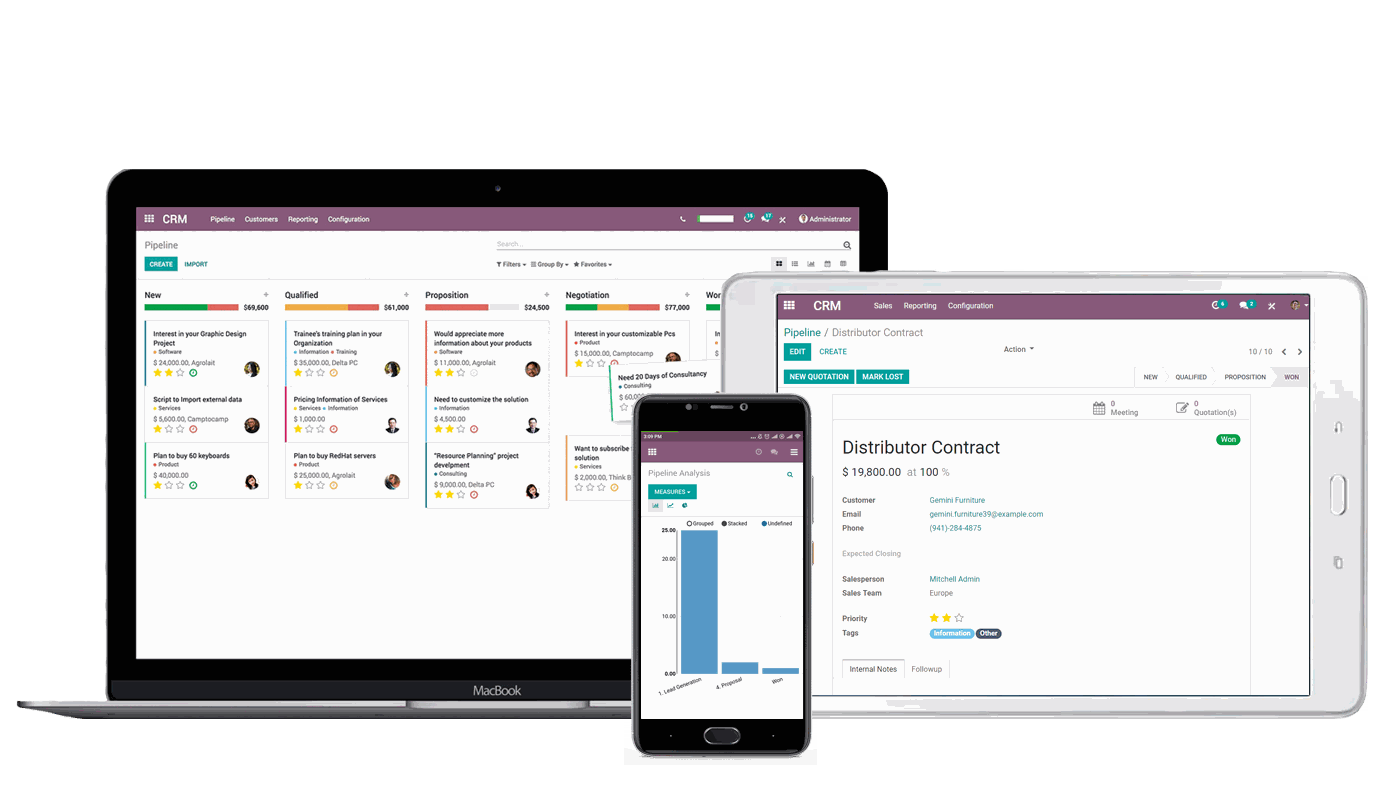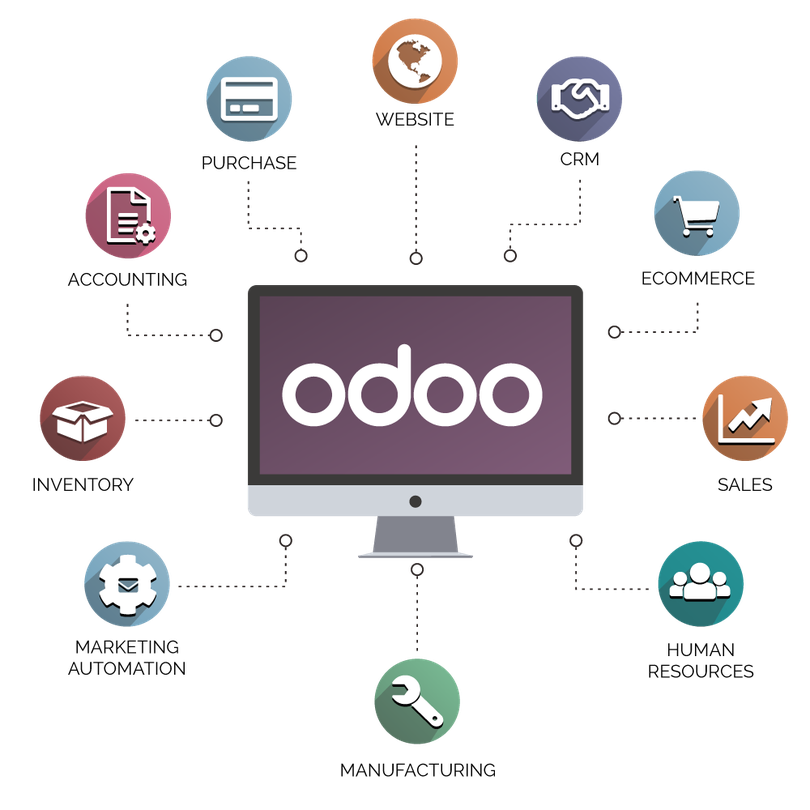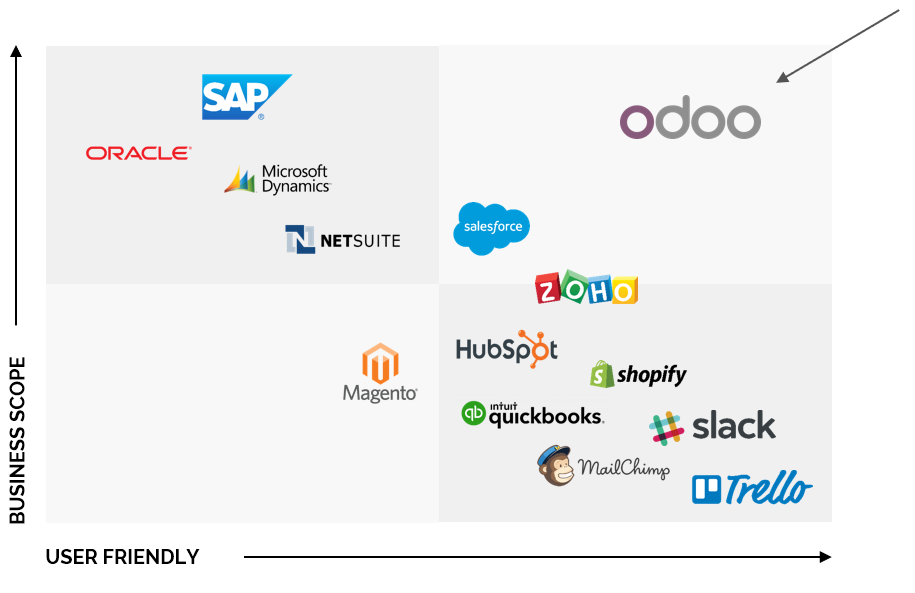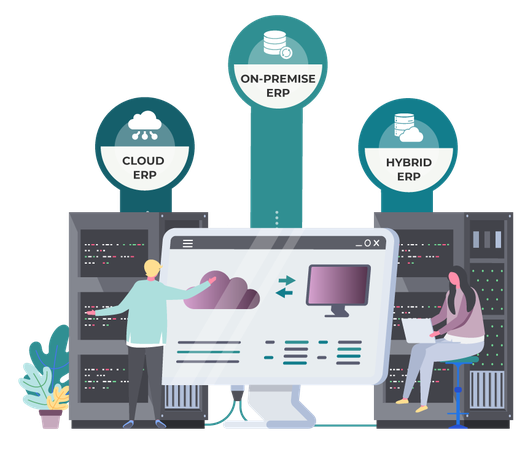Enterprise Resource Planning
ERP or Enterprise Resource Planning is the management of core business processes such as Accounting, Project Management, Marketing, Manufacturing, Supply Chain, Sales, Human Resources, and more. It is a platform that centralizes all the data & information about the business and its operations.


How does an ERP work?
ERP works as a brain of a business. Multiple areas of a business and their processes are connected together, enabling the flow of the data between them.
It combines together various different reports and metrics across all business departments into the same view. With that, it's very easy to see the health of the business, have a full view of what is going on, and how business resources are spent.
Today, ERP systems are critical for many businesses of all sizes and in various industries.
Benefits of ERP system
Streamline your processes
ERP software not only digitizes your company but also helps you set correct processes, streamline them & set clear responsibilities for every business action.
Automate your operations
An ERP system saves your time – it automates your daily operations (purchasing, accounting, payroll, recruitment, inventory & sales) and lets you focus on your core business.
Business health overview in seconds
Having all data in one place allows you to create reports & charts from all your departments instantly - whether it is sales results, inventory levels or P&L.
Deliver better services
Having every business activity under control helps you provide better quality services, support & experience to all your stakeholders (clients, employees, vendors, etc.)
Which business management system should you use?

Large ERP (SAP, Oracle, Dynamics)
Fully integrated solution with a wide range of business functionalities. Suitable for large businesses & corporations, as these solutions are budget-intensive & not affordable for SMEs.
Vertical Apps (SalesForce, Trello, HubSpot)
Flexible & user-friendly solutions, focused on 1 process or flow. They are not integrated and automation possibilities are limited. Often searched for by SMEs because of low pricing.
Odoo ERP → All benefits combined
Combines the best of large ERP systems & vertical apps → big scope of functionalities & automation with flexibility & budget-friendly pricing.
Types of ERP systems
Cloud ERP
You can access this system anytime, from anywhere. The only thing you need is a reliable internet connection.
On-premise ERP
Your data are hosted on your own servers & devices so you can have 100% full control of your data.
Hybrid ERP
Combines both cloud & on-premise approaches to support the most specific need of your business.

Odoo ERP solutions for your industry

Retail
Brick-and-mortar or e-commerce, Odoo can handle & automate all retail operations from purchasing, inventory, sales & accounting processes.

Manufacturing
All manufacturing businesses, small or large, can benefit from automating their production & making their supply chain more efficient.

Food Services
Food production, wholesale & retail have their own specifics - Odoo helps you track the removal strategy & expiration dates to serve the freshest products.

Field Service
When you are onsite, what matters is that you deliver excellent services. Manage your workdays from anywhere, on any device, track your working time, sell products and create invoices with one click.
Can't find your industry? Contact us!
Get in touch with our consultants for a personalized Odoo demo for your business.
Frequently Asked Questions (FAQs) about ERP
One of the main indicators is the inefficiency of your insights. In fact, if you are not able to correctly manage your inventory, keep monitoring customer satisfaction or simply transforming leads to clients, your company can greatly benefit from an ERP. The lack of collaboration between different departments across your company is also a bad sign and the streamlined processes thanks to an ERP would allow your company to function properly.
If you can’t reasonably manage the data you’re collecting – or even worse, can’t collect – then an ERP can be more than interesting for you.
Despite being a tool exclusively used by large companies for a long period due to cost, nowadays, ERP systems convene to almost any company if not all. The misconception that only large companies use ERP can be linked to the unawareness & misinformation concerning ERP systems. As a matter of fact, an ERP is a precious tool that allows any company – from SMEs to large companies – to automate business processes. Today, there is a diverse set of software applications – including ERPs – for companies from all industries. Thanks to an increase in the offer on the market, an ERP can now be adapted to any company and is definitely not something reserved for large companies. After all, any company would largely gain from the benefits of an ERP.
An ERP contains functionalities for diverse business processes such as finance, HR, inventory management, procurement, distribution and CRM. Its main goal is to streamline operations while centralizing information.
CRM stands for Customer Relationship Management & a CRM system is built to follow-up the satisfaction of the customers. In fact, whether it be thanks to better ad targeting or personalized communication, the main goal is to make customers happy. This is a software that is used by the front-office, meaning that only departments such as sales & marketing will use it.
Compared to a CRM software, an ERP can facilitate processes across diverse workflows – finance, HR, inventory management, etc. It is a system that encompasses the whole business while CRM is more targeted. In fact, it’s a tailored solution for customer-related matters. Nonetheless, an ERP – such as Odoo – can integrate CRM. In a nutshell, the main difference between these two is the scope - an ERP usually covers the functionalities of CRM & many others, while CRM focuses purely on the relationship management with your customers.
In order to correctly choose an ERP system, it goes without saying that you should deeply understand the processes in your company. In fact, if you don’t have a clear understanding of what your business requires, you might get off to a bad start concerning ERP implementation. Once you thoroughly determine which are the relevant parties & establish a list of requirements, you can then get off to a good start. One should also bear in mind that an ERP is the core component of a business’ structure & that integrating previously used systems can be fruitful. Another aspect to take into account is the references & reviews of current users. Indeed, seeking references from your industry or similar ones can help you make up your mind. Understanding how an ERP worked out for another company in a similar sector can clarify some questions & be influential in your decision-making.
Depending on the scope of the ERP, its cost can substantially vary. In fact, systems for larger companies tend to be more costly than niche software but tailored solutions can be very fruitful without getting too costly. A company that knows its requirement can save money by focusing on the implementation of essential solutions. The licensing costs as well as maintenance, hosting & customization costs are also to consider.
As a matter of fact, the ERP system one company needs is not the same as another & therefore the cost is very dependent of the scope & customization required.